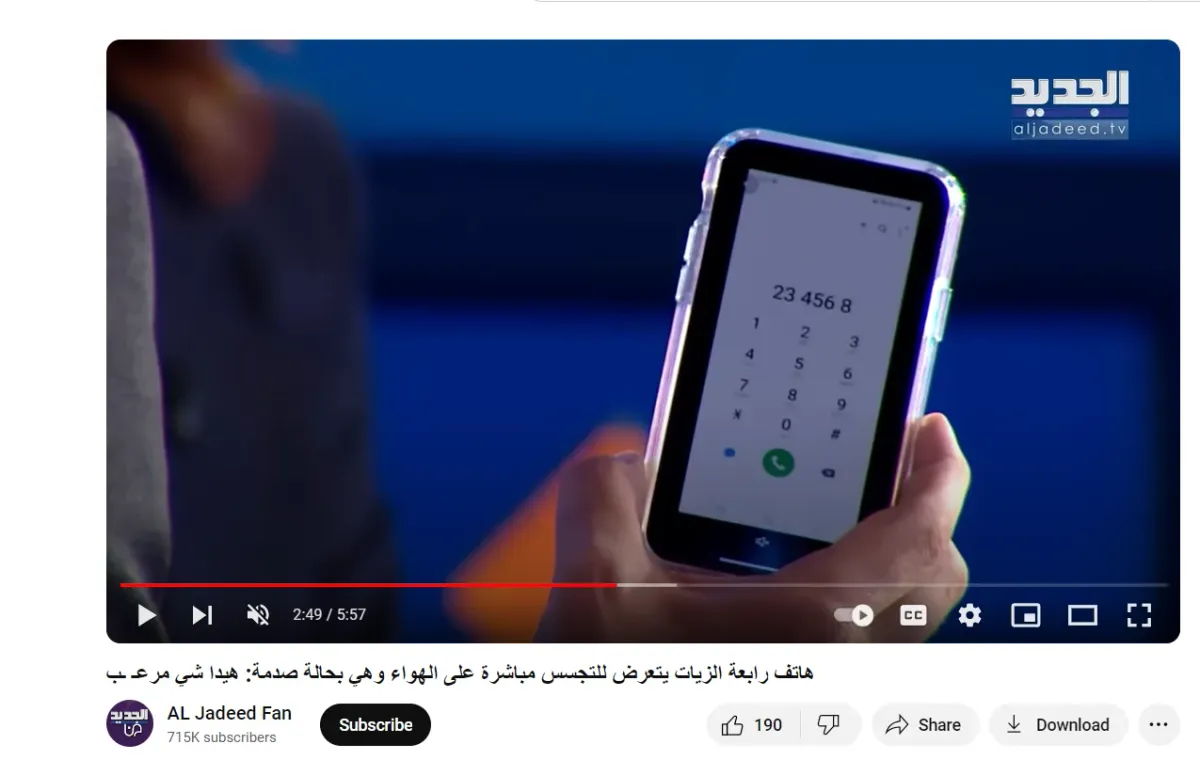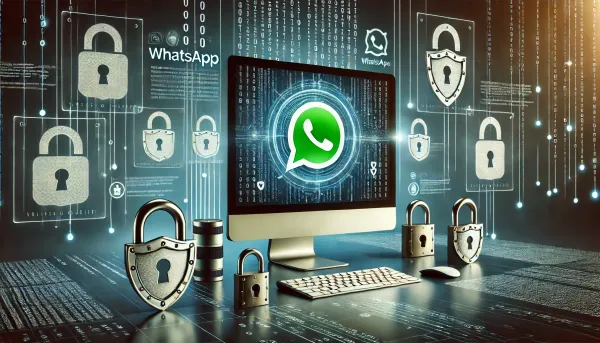Analyzing Rabia Al Zayyat’s Cybersecurity Episode at Al Jadeed TV “فوق ال 18”

In a recent episode of a popular program on Al Jadeed TV, hosted by Rabia Al Zayyat, viewers witnessed a segment portrayed as a live device hacking demonstration by an individual claiming to be a Lebanese Cybersecurity expert and ethical hacker.
The YouTube video, titled dramatically as “Rabia Al Zayyat’s phone is spied on live on the air and she is in shock: This is terrifying“, sought to attract viewers through sensationalism.
The reaction in the YouTube comments was overwhelmingly negative, with viewers expressing a desire for more insightful cybersecurity content and practical advice on protecting their mobile devices.
As a Lebanese software engineer and cybersecurity expert, I see a problem with how Lebanese TV shows describe cybersecurity. They often simplify and dramatize it too much. My aim with this article is to correct these errors and show what hacking and cybersecurity really involve.
We’ll use Rabia Al Zayyat’s show as an example to clear up common myths and stress the need for real cybersecurity skills and knowledge.
Breaking Down Rabia Al Zayyat’s Interview on Al Jadeed TV: Comparing Device Hacking Myths and Facts
1. The Claim of Device Hacking
On Rabia Al Zayyat’s show, a so-called cybersecurity expert and a Lebanese hacker said he could hack a smartphone live. But this wasn’t real hacking. He just used a tool that can control one phone with another, something many people can do.
2. Uncovering the Reality Behind the Dramatic Demonstration
The guest used a RAT, which is often used for help with technical problems. This isn’t hacking, which involves breaking into systems without permission.
Hacking involves unauthorized access, often through exploiting vulnerabilities, which was not demonstrated.
3. The Lack of Technical Disclosure
Real hacking demonstrations explain how the hacker got in. The guest didn’t do this, showing he might not have real hacking skills.
The absence of technical details and the failure to show any advanced skills or knowledge in cybersecurity further suggest that this was a mere display of a remote access tool, not hacking.
4. Debunking The Myth
The guest told viewers to never click on links, but this is unrealistic. It’s better to teach people how to tell safe links from risky ones and use internet security tools.
Understanding Link Safety
It’s important to differentiate between safe and suspicious links. Safe links typically come from known, reliable sources and are integral to online navigation. Conversely, suspicious links, often from unfamiliar sources, require caution and may pose risks.
Educating on Secure Browsing
Educating users about internet security, recognizing safe sources, and staying informed about cyber threats is more effective than avoiding all links. Modern browsers and security tools also offer features like security warnings and site verifications to aid in safe browsing.
A Balanced Approach
Complete avoidance of links is impractical in the digital age. However, a balanced approach, combining awareness, education, and the use of security tools, is key to navigating the internet safely and effectively.
5. Misrepresentation of Skills
The guest’s statement that “only hackers can do that” isn’t accurate. In fact, Remote Access Tools (RATs) can be easily found and used by anyone who knows the basics of the app. Saying that this is a special skill only hackers have really simplifies the complicated and demanding world of cybersecurity too much.
The Misconception
The concept of device hacking and cybersecurity in Lebanon is often misunderstood, particularly by the media. Consequently, this lack of understanding has paved the way for a concerning trend: Lebanese individuals promoting themselves as cybersecurity experts and ethical hackers without possessing the necessary skills or knowledge.
These self-proclaimed experts exploit the general public’s ignorance about cybersecurity, misleading them with exaggerated claims and sensationalized demonstrations.
It’s really upsetting to see this kind of trickery. Our work in cybersecurity needs a lot of technical skill and a strong sense of doing the right thing. But these fakes make it seem like cybersecurity isn’t serious. They’re not just leading people astray, but they’re also getting in the way of real efforts to teach about and guard against actual cyber dangers.
It’s very important to deal with this problem and help people in Lebanon understand more about cybersecurity. This way, we can stop people from being fooled by false claims.
How Media Responsibility Shapes Public Perception
The media in Lebanon bears significant responsibility for the widespread misconceptions about hacking. Time and again, we see media outlets inviting guests who make outrageous and false claims about cybersecurity. These guests, often without any real expertise, are given a platform to spread misinformation, and the media not only allows this but often dramatizes these claims, adding to the deception.
This kind of careless behavior by media hosts is unacceptable and harmful. When they push these false stories, they’re doing more than just entertaining people – they’re spreading misinformation. This betrays the public’s trust and leads to a lot of confusion about important cybersecurity issues. Media professionals must really check their guests’ backgrounds and focus on sharing true, factual information. The media’s job is to inform and teach, not to make false stories seem bigger just to get more viewers and higher ratings.
How Device Hacking Actually Works
1. Subsystem Vulnerabilities
Hacking devices, such as smartphones or computers, involves a thorough understanding of their internal components and potential vulnerabilities. Hackers must be well-versed in operating systems like iOS and Android, particularly their security arrangements. This expertise extends far beyond merely utilizing tools for remote system access. It requires identifying and exploiting the system’s vulnerabilities, demanding continuous learning and keeping abreast of the latest security updates.
2. Network Exploitation
Effective device hacking usually involves breaking into network security. It also means knowing how smartphones link up and work with networks like Wi-Fi, cellular data, and Bluetooth. Hackers study these networks to spot weak points they can use to get into a device without permission.
3. Social Engineering and Phishing
Social engineering plays a key role in device hacking. It’s about tricking people into giving away private information or doing things that put their own safety at risk. Common methods like phishing use fake messages to fool users into sharing their personal data. This kind of tactic needs a deep understanding of psychology and creativity, much more than just basic tech skills.
4. Advanced Device Hacking Tools
Real hackers use advanced tools that need strong coding skills and knowledge about security.
5. In-Depth System Knowledge
Hackers must know a lot about how phones work inside, not just how to use a tool to control them.
6. Customized Malware Creation for Device Hacking
Hackers often build or change malware for specific targets, which requires deep programming knowledge.
7. Encryption Bypass Techniques
They also need to break through encryption, a tough and skillful job.
8. Hardware Exploitation
Sometimes, hackers have to deal with the phone’s physical parts, which needs electronic engineering knowledge.
9. Risk Assessment and Management
Ethical hackers must make sure their work doesn’t accidentally harm systems or data.
The Importance of Technical Depth
Lebanese TV guests should talk about specific hacking methods and skills, not just show off basic tools. Without this, their demonstrations aren’t useful and can be misleading.
Simply holding a smartphone and using RATs, while claiming it to be hacking, is a gross oversimplification.
Authentic device hacking is a complex and nuanced process, requiring detailed explanation of the methodologies and strategies employed. Without this essential information, the demonstration is not only uninformative but borders on being misleading. It’s essential for experts to provide substantive insights into their actions, transforming a superficial display into a valuable learning experience for the audience.
Guiding TV Programs Toward Genuine Representation of Device Hacking and Cybersecurity in Lebanon
The Need for Depth and Accuracy in Device Hacking Discussions with Lebanese Hackers
TV should focus on guests with real skills and deep knowledge. They should talk about the technical side of their work and show real demonstrations. This will help viewers understand cybersecurity better.
Showcasing Real Skills
Television producers and hosts should prioritize showcasing guests with verifiable skills and deep technical knowledge. It’s essential to move beyond superficial demonstrations, like controlling a smartphone with another device, which do not accurately represent the complexities of hacking or cybersecurity.
Incorporating Technical Details
A better way to teach would be for the guest to explain the technical parts of their work. They could talk about actual cybersecurity projects, the problems they ran into, and how they solved them. When they show how things work, they should also explain the tools and methods they use, making sure to follow ethical rules. This kind of approach doesn’t just teach the audience; it also shows the real skills and deep knowledge needed in this field.
Evaluating Guests
TV programs should rigorously vet their guests’ credentials and claims. It’s important to ensure that those presenting themselves as experts have a proven track record in cybersecurity. This vetting process adds credibility to the program and ensures that the information being presented is both accurate and reliable.
Balancing Entertainment and Education
While entertainment value is important, it should not come at the cost of misinformation.
Striking a balance where viewers are both engaged and educated should be the goal. By focusing on real skills and technical insights, TV programs can play a crucial role in demystifying cybersecurity and providing viewers with valuable, trustworthy information.
Elevating Cybersecurity Discourse
By focusing on real skills and detailed technical talks, TV programs can really help the public understand cybersecurity better. This method makes the show more trustworthy and gives viewers important knowledge in a world that’s becoming more and more digital.
Conclusion
To our readers, TV hosts, and guests, this talk reminds us all that we play a part in how people see cybersecurity. Viewers should watch these shows carefully, looking for real depth, not just eye-catching headlines. TV hosts need to make their shows better by bringing on real experts who know a lot about cybersecurity. Guests who say they’re experts should remember they have a responsibility to share true and educational information. We should all work towards a media world that shows cybersecurity accurately and seriously, giving everyone the knowledge and respect this important area deserves.



